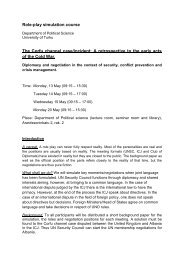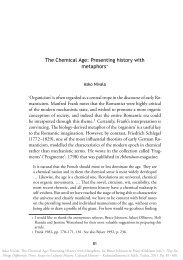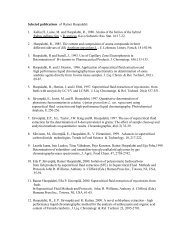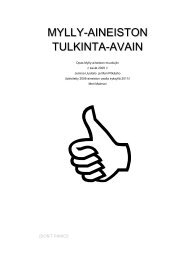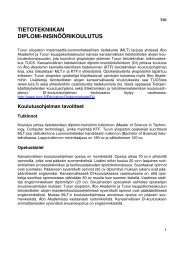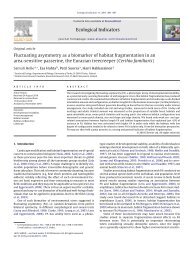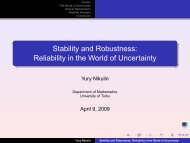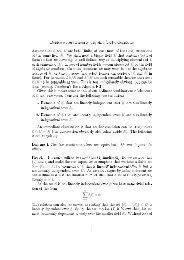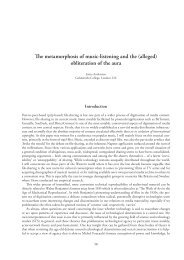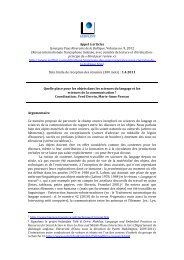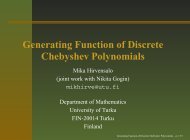The Chemical Age: Presenting history with metaphors∗
The Chemical Age: Presenting history with metaphors∗
The Chemical Age: Presenting history with metaphors∗
You also want an ePaper? Increase the reach of your titles
YUMPU automatically turns print PDFs into web optimized ePapers that Google loves.
<strong>The</strong> <strong>Chemical</strong> <strong>Age</strong>for the interpretation of metaphors instead of the author. Schlegel franklyadmitted this in a private letter to his brother August Wilhelm:<strong>The</strong> obscurity of abstract metaphysics will protect me, and if you writeonly for philosophers, you can be surprisingly bold before somebody 〈fromthe police〉 will write down notes of it or even understand anything of theaudacity of the matter. 71Schlegel can explain his hermeneutic strategy in a private letter. Wheninterpreting works that are written under the threat of censorship, comparisonbetween private letters and published texts can become a valuablecultural-historical method of discovering the different strategies by whichan author has avoided censorship.It is not so surprising that the public discovered democratic ideas inthe Athenäum magazine. Earlier Schlegel had published a more straightforwardpolitico-philosophical study, the ‘Treatise on the Concept ofRepublicanism’ (‘Versuch über den Begriff des Republikanismus’, 1796).In this study he criticized Kant’s definition of the republic, arguing that therepublic must always be democratic, not led by an enlightened sovereign.Indeed Schlegel even defends the legitimacy of a temporary revolutionarygovernment – as the Jacobin Party had during the French Revolution – butonly if this is necessary for the transition period when changing to democracy.72 <strong>The</strong> text was published in Berlin in Deutschland-magazine, which71 Friedrich Schlegel to August Wilhelm Schlegel, 19. January 1796, KFSA XXIIII, p.275. No. 137. <strong>The</strong> expression in angle brackets is written in the marginal or betweenlines. See KFSA XXIV, p. lii. Cf. Brunschwieg 1976, p. 285. Although the secondaryevidence from Schlegel’s private correspondence is cogent, my argumentation is notdependent on it. In his published essay ‘On Incomprehensibility’, Schlegel alreadygave enough hidden hints to interpret his ambiguous irony and metaphors (theinterpretation of which was at the readers’ own risk) as camouflage for politicalradicalism. Nonetheless, the given quotation from a private letter proves that he washimself conscious of this strategy and afraid of censorship.72 KFSA VII, pp. 15, 17, 20. See also Beiser 1992, pp. 250–251; Behler 1989, pp.265–271. Although this exceeds the temporal scope of early Romanticism, it shouldbe noticed that the metaphor of chemistry played a negative role in Schlegel’s latephilosophy. In his conservative phase, Schlegel presented a comprehensive diagnosisof his age in ‘Signatur des Zeitalters’ (‘Signature of the <strong>Age</strong>’, 1820–1823). <strong>The</strong>rehe criticized the revolutionary tendencies by integrating the chemical metaphor ofdissolution into the metaphor of organism. For instance, the older Schlegel comparedAsko Nivala: <strong>The</strong> <strong>Chemical</strong> <strong>Age</strong>: <strong>Presenting</strong> History <strong>with</strong> Metaphors. In: Bruce Johnson & Harri Kiiskinen (eds.): <strong>The</strong>y DoThings Differently <strong>The</strong>re. Essays on Cultural History. Cultural History – Kulttuurihistoria 9. k&h, Turku, 2011. Pp. 81–108.101




